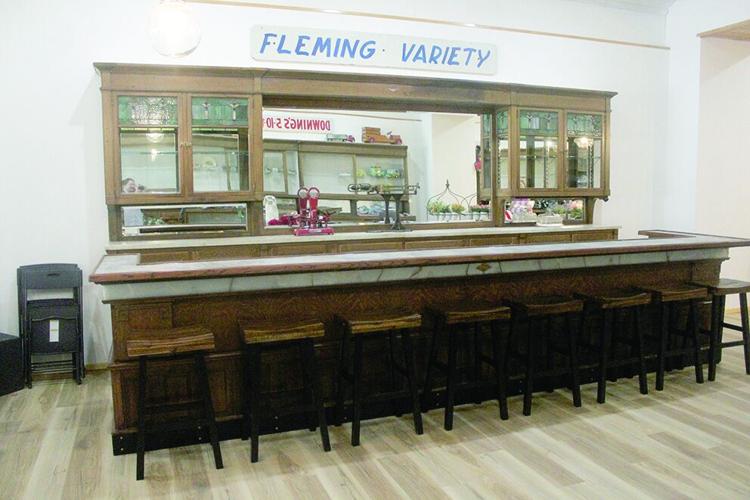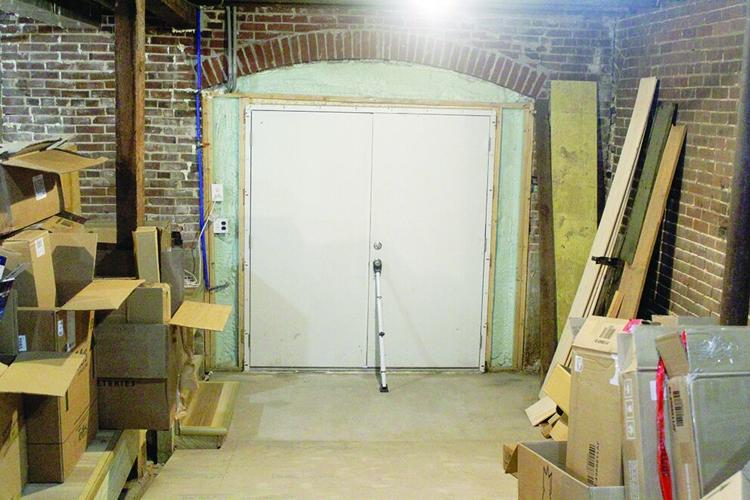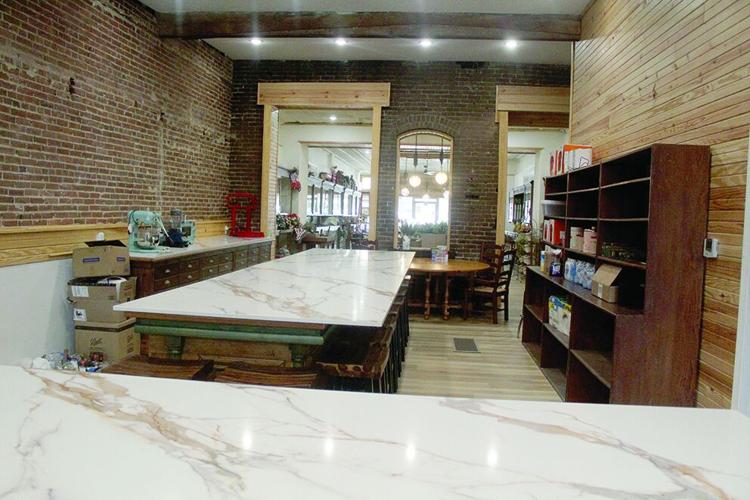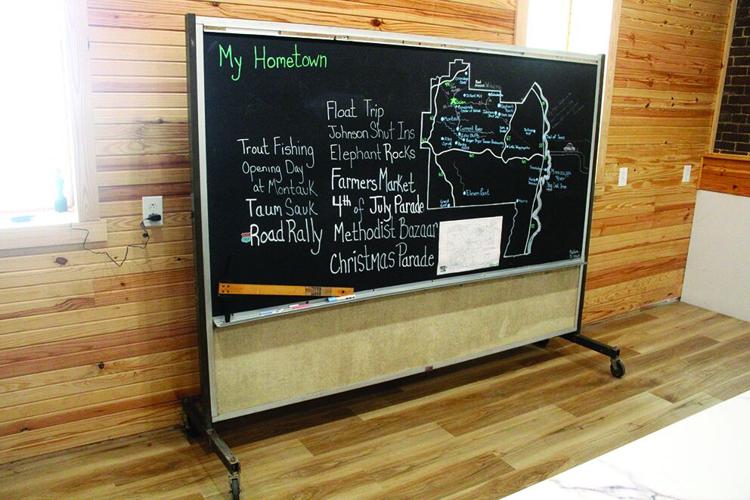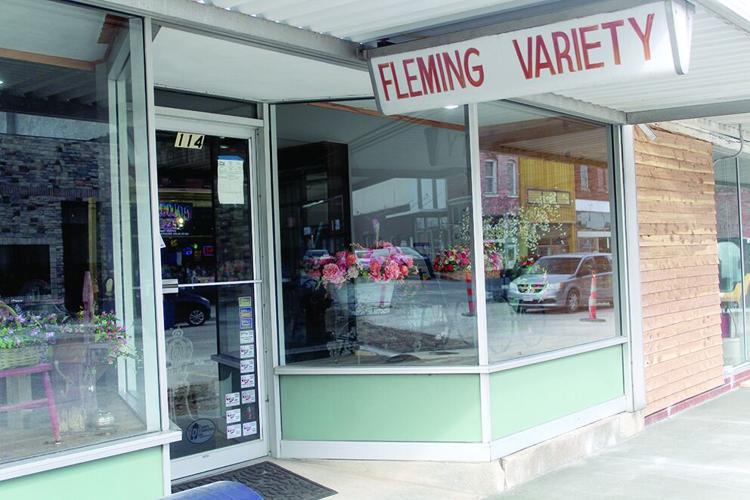In 1954, when the Benowitz family of Fleming Variety store moved to the store’s location on Fourth Street in Salem, there were piles of disassembled, wooden display units stacked to the ceiling in the basement. All the doors were taken off, and the shelves were laid flat below the main portion of the store, left to accrue dust and dirt. It’s understandable why the wooden shelving units were set aside—it was in favor of a more functional shelving unit, the type of shelving one might see at a dollar-store where product could be swapped in and out, as needed.
Lisa and Wes Hester, founders of the Dragonfly Wings Foundation, have been long at work turning the Fleming Variety store into a non-profit foundation store, after its purchase from the Benowitz family in 2018. The Hesters had been avidly looking for someone to put together the pieces in the basement—to restore the historic charm to the building—but were finding it difficult to find anyone that knew anything about the antique wooden units—and whether or not they were even salvageable. Lisa estimated it had been about two years that they’d been looking for someone, with no luck.
That is, until the Hesters came across a listing on Facebook marketplace for a 13-foot table—perfect for hosting a community event. The piece was listed by an elderly gentleman by the name of Bob. They decided to purchase the piece, and the gentlemen delivered the table to the store. On the floor, Bob noticed a single piece of wooden cabinetry on the floor.
The gentleman glanced at the piece and observed, “That’s green-washed oak.”
“What do you mean?” Lisa had asked.
The gentleman explained that in 1845 to 1849, when Macy’s had opened, all of the oak made for the little stores across the United States had copied Macy’s by green-washing oak—it made, they thought, the pieces look more expensive, more high-class. They had purchased the pieces from a place in New York City.
“Boy, it’s a shame you don’t have the rest of it,” said Bob.
Lisa took the gentleman downstairs where the rest of the pieces were stacked to the ceiling. He looked at all of the pieces—the disassembled doors, shelving, cabinetry, the glassware—and he asked if he could pick up the pieces and put them back together.
Sure enough, two weeks later, Bob returned to the store and picked up all of the pieces. Six weeks later, he assembled all the doors, shelving, cabinetry, and glassware in the store. He completely cleaned the pieces of decades of dirt and grime and put them back together again like they were new. When he had finished the project, he estimated the pieces had been in the store since 1845 to 1849 and were here when the store had originally opened—before Fleming.
The gentleman was named Bob Lafevre, owner of Bob’s Antique Furniture & More of Phillipsburg. He passed away last week on Wednesday, March 5. Lafevre was going to be at the store for its grand opening to showcase the marvel of the original pieces. Lisa hopes that the community comes out to the grand opening—to see the history that Lafevre helped restore.
“I call that my God table,” shared Lisa, of the 13-foot Facebook marketplace find. “I had prayed—I didn't know what we were going to do. I thought we would have to leave it all down there. I was looking at new displays and trying to figure it out, and he just walked through the door that day and just sort of put everything together for us.”
Not only is the store a testament to the history of the town, but it’s also a testament to the work of A.J. Tinker, instructor of the Construction Trades courses, and the labor of the students who worked to put the building back together again. The students were able to use the store as a training ground—they put together the wiring, lighting, plumbing, flooring, drywall, and two bathrooms. The students are part of a work-study program and could only work for a total of two hours at a time.
Pretty much everything in the store was put together by the students. If it wasn’t by students, it was by local contractors.
“We want to open it up to our community,” said Lisa. “We want to try to raise money for our programs and just let people see it. Because I don't think there's going to be any place else that you're ever really going to see something like this again.”
The store will host pop-up events, starting with a spring-summer event from April 26 to May 3, 10 a.m. to 6 p.m., featuring Memorial flowers and other handmade items, like quilts. Lisa also shared they plan to have “food days” during the week, like a chicken salad day or pizza day. Any proceeds from the store will go toward local teachers and educational programs.
More than just for pop-up events, Fleming is intended to be a space for community, said Lisa. She said plans on the horizon include hosting cooking, cross-stitch, and canning classes. Her daughter is a French culinary institute-trained chef and may be able to do a “farm to table” night, where she’d prepare dinner using only fresh, locally grown food for a number of attendees. The store won’t be open all the time but host different events over the year, like during the winter or fall.
As for the first official opening day of the store, Lisa and Wes shared they weren’t really nervous about opening. Lisa shared that even if it’s just friends and family showing up—she’s happy. It was a labor of love for the community, by the community, and she’s eager to share it.
Dragonfly Wings Foundation
The Dragonfly Wings Foundation has partnered with the Dent County Schools Foundation and has pledged $10,000 a year to help teachers get up to $500 for items for their classrooms, a school trip, or otherwise.
The foundation has also been working hard on getting the Construction Trades building at Salem High School finished up by the end of the 2025-26 academic year. Lisa estimated that the amount still needed to finish the building is between $250,000 to $300,000. The building’s interior still needs finished, HVAC, and electric. The building is planned to be a classroom for the Construction Trades courses, along with a little something else.
Wes is part of another 501(c)(3) foundation in Springfield—the Missouri Cybersecurity Center of Excellence, serving the Southwest Missouri regional community, university students and trained early cybersecurity practitioners, and small to medium sized organizations. MCCoE equips the upcoming cybersecurity workforce by training students using real-world data, operations, and decisions. Part of the Construction Trades building, indicated Lisa, may be able to host a cyber-security program at the high school when it’s finished.
“So, when you come out of this cyber security program, you can get a job in cyber security the day you're out,” said Lisa, “In St. Louis, the people that are working in private industry can hire you right out of high school.”
“We cannot do that without the building being finished,” Lisa stated further. “Because they don't have a classroom, and you have to have a climate-controlled network operating center.”

